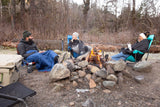From Bush to Table: Hand-Picked Berry Recipes You’ll Want to Make

(Words and Photos: Rafa Godoi)
If you’ve ever spent time in Washington during the summer, whether you are on an intensive hike or just going for a walk down around the neighborhood, you are bound to come across some berry bushes. You will know how hard it is to restrain yourself from plucking some delicious berries off the bushes all around you. From tart to sweet, and a variety of shapes, textures, sizes, and flavors it all looks delicious, however, some of the berries are not edible. Wild berries grow in abundance in Washington and all surround the Pacific Northwest. Before you go out and munch to your heart’s delight, be sure to know what to look for so you are safe while foraging for berries.
In this piece, I will outline my three favorite types of edible berries in Washington. Salmonberries, Huckleberries, and Blackberries… I will show you where to look for them, what to be wary of, and some of my favorite berry recipes to make with your fruity haul!
I find such amazing joy in these luscious tiny gems. Some berries are very delicate and it is best to immediately eat them as-is. They can not be sitting in containers nor do they travel well. Others bake beautifully into cakes, pies, and cobblers which I love, and cannot wait to share a delicious recipe with you. I also have some refreshing smoothie and sweet-tart jams and sauce recipes so you have some berry inspiration from sweet desserts to savory meals. Here in the Pacific Northwest, mild temperatures, lots of rain, and rich soil gives our native plant species a great environment to take root and flourish.

The Berry Rule
According to the “berry rule,” a general guideline meant to help gauge toxicity explains: only 10 percent of white and yellow berries are edible; 50 percent of red berries are edible; 90 percent of blue, purple, or blackberries are edible; and 99 percent of aggregated berries—those recognized by their clusters, such as blackberries and raspberries—are edible. Modernsurvival.org offers this rhyme to help berry-pickers remember: “White and yellow will kill a fellow. Eating red could be good, could be dead. Purple and blue are good for you.”
Salmonberries
In my opinion, early summer is the perfect time to go on a hike and enjoy waterfalls. Mainly because it is not too hot yet there is enough water running from melting snow and early rainfall season. A few weeks ago, I went on a bike ride around Cherry Creek Falls - one of my favorite trails to hike after work or to enjoy a bike ride out in the wilderness. It has a rewarding waterfall at the end of the trail which creates the perfect conditions for Salmonberries.
The Salmonberry plant prefers moist, shady areas with a bit of sun and can commonly be found near creeks. The Salmonberries are native to the West Coast of North America, and were traditionally eaten with salmon or salmon roe by Native Americans in the Pacific Northwest.
Mature berries are most commonly a yellow-orange. Younger berries may appear red. Berries are bumpy in shape, much like blackberries (beware of the thorns on the plant). Salmonberries are best from early May to late July. It is the perfect trail snack and even better when eaten as-is, mildly sweet to neutral taste. I spent double the time I normally take to get to the waterfall because of the many stops I made to munch on fresh and delicious berries.

Huckleberries
Another berry I love is the huckleberry. When I have time to go on long hikes or multi-day backpacking trips I will certainly take time to find huckleberries. The amount and variety of huckleberries found growing wild in Washington is abundant. There are at least 12 different species of huckleberry, both native and non‐native, found in Pacific Northwest forests. Sources vary and depending on the region you are exploring and foraging it may differ on what you can find. Dwarf huckleberry, Cascade huckleberry, Mountain huckleberry, Bilberry, Oval-leaved bilberry, Evergreen huckleberry, Red huckleberry, and Alpine bilberry are some of the most common in our region.
Going on a hike with friends walking along chatting about whatever, bonding over berries. These simple things can be so good for us. Calming, bonding, fresh air, laughter, and good conversation. I have a deep appreciation for what nature provides. We easily lose track of time, spending hours picking as many huckleberries as we can.
Most are black but they can appear bluish, pinkish red, and purple. Huckleberries are smooth and round with a sweet to tart taste.The plant is an evergreen shrub, but produces berries in the summer. This shrub thrives mostly in the shade with some sun. It is common to find plants sprouting out of or near downed trees or stumps.The Native Americans in the Pacific Northwest were fond of this berry, traveling long distances to gather them, eating them fresh, and drying them and then adding them into cakes. While camping, I love adding them into pancakes and mixing into granola, oatmeal, yogurt and other berries for breakfast.

Tiny in size, these berries will test your patience. Sometimes they can be found in big concentrations or very spread apart.
This past week, we scored a big haul. We were camping near Snoqualmie Pass, where the mild temperatures allow wild berries to grow in abundance. A little over an hour out, I was able to pick over two pints of berries. I was grinning ear to ear with these luscious tiny gems. If you ever find yourself in this area, be sure to take a moment to hunt for these delicious berries - I promise, you won’t regret it.
Blackberries
Last but not least, out of my favorite berries in Washington, hands down goes to the blackberries. They are very similar to some berries we call “Amora” back in my home town in Brazil.
When I am not deep in the wilderness hiking, I am certainly roaming on odd roads, urban trails, parks and exploring around the neighborhood where we can easily spot blackberries.
Often considered a weed, these berries can be found in backyards, parks and along roadsides across the country. This plant grows well in the sun and large patches known as brambles. This berry is known all over the world, but is very popular in the Pacific Northwest due to the abundance in which they grow here. The berry and plant were commonly used by Native Americans in the Pacific Northwest as food and used as a medicinal plant.
Black when mature; red and green when they are still growing, the blackberry is best when a deep black color. They are bumpy in shape (beware of thorns on the plant).

The blackberry peak season is from July through September. We are in the prime season right now and yes, I am having daily berry feasts.
They are great to be eaten as-is. I love the bursts of sour and sweet pops of flavors while eating them. In addition to being eaten as-is, they can also be transformed beautifully into cakes, pies, and cobblers, or just a simple and refreshing smoothie.
Recipes
My favorite blackberry smoothie recipe, which was shared by a friend a long time ago and sooner after, I found it gained popularity online on many channels and platforms. It is very easy and refreshing especially now on summer days and enjoyable to make with my own hand picked wild berries.
Blackberry Pineapple Smoothie
Ingredients:
- 3/4 cup frozen blackberries
- 1/2 cup frozen pineapple chunks
- 1/2 cup plain non-fat Greek yogurt
- 1 cup unsweetened almond milk
- 1 tablespoon honey (or to taste)
Steps :
- Add frozen blackberries, pineapple, yogurt, almond milk, to the blender.
- Process until smooth.
Tips for making the Blackberry Pineapple Smoothie:
- To make a vegan blackberry smoothie, swap out the dairy yogurt for vegan yogurt, and omit the honey.
- Use frozen blackberries and pineapple. They will help thicken the smoothie and keep it extra cold.
- Use whatever type of milk you prefer. Soy milk, almond milk, coconut milk, oat milk and dairy milk are all great options.
- Add peanuts powder, flax seeds, hemp seeds, or protein powder to increase the nutritional value of your smoothie.
- If you have a sweet tooth like myself, add condensed milk to taste.
- After everything is blended, I always add some fresh or frozen blackberries on top to add an extra fresh taste. Hope you enjoy it.

Beside the smoothie, my other addiction is cobbler. It’s extra special when baked with hand picked berries. This easy Blackberry Cobbler recipe takes just 7 ingredients and about 10 minutes to prepare. It has a juicy filling and a sweet and a crisp golden crust.
Blackberry Cobbler
Ingredients:
- 1 cup + 4 tablespoons sugar, separated ( I like to use a half cup of brown sugar and a half cup of granulated raw sugar - it gives an earthy, crunchy taste. Regular sugar works perfectly too)
- 1 cup self-rising flour
- 1 cup whole milk
- 1/2 stick butter, melted
- 2 cups fresh or frozen blackberries, rinsed and patted dry.
- Ice cream, for serving (optional)
Steps:
- Preheat the oven to 350 degrees.
- Combine 1 cup of sugar with 1 cup of self rising flour in a large bowl.
- Stir in the milk, then the melted butter. Mix until well-combined.
- Pour into the bottom of a greased 9 x 9 inch baking dish.
- Distribute the berries throughout the top. (They’ll sink in further as they bake.)
- Sprinkle 2 tablespoons of sugar over the top, reserving 2 tablespoons for later.
- Bake for 45 minutes, remove from the oven and sprinkle the remaining 2 tablespoons of sugar on top.
- Bake for 10 minutes, or until the top is golden brown.
- Serve immediately, (add a scoop of ice cream, of course!)
Tips for making the Blackberry Cobbler:
- Although the original recipe calls for whole milk, I normally use almond milk and it comes out great. It also can be made vegan by switching the butter for coconut oil.
- To make homemade self rising flour, add 1 + 1/2 teaspoons of baking powder and 1/2 teaspoon of salt for each cup of flour.
- If desired, you can sprinkle more berries on top once it has started to bake and is slightly set to keep some closer to the top - about 30 minutes in.

Summer adventures, hand picked berries and baking extravaganzas… I can't think of a better way to spend my weekends. Whether you are on an intensive hike or just going for a walk down around the neighborhood, I hope you come across some berry bushes and enjoy the fresh taste of nature. But before you go out and munch to your heart’s delight, be sure to know what to look for so you are safe while foraging for berries. Remember, if in doubt, do not eat any wild berries. Hope you have a sweet summer.
-
Shop the gear from this post:






